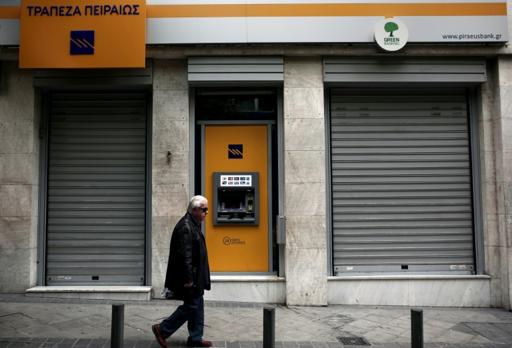Four major Greek banks must find up to 14.4 billion euros ($15.8 billion) to survive potential economic shocks, the European Central Bank said, releasing the results of an in-depth financial health check.
Weakened after years of recession, Greece's banks took a further battering this year when the government pushed the country to the brink of a euro exit in a standoff with Berlin and Brussels over the terms of Greece's international bailout.
While less than anticipated under the new aid package -- Greece's third since 2010 -- the big four banks now have until Friday to explain how they will plug the capital hole on their balance sheets.
Greece's Alpha Bank, Eurobank, the National Bank of Greece and Piraeus Bank were all submitted to a health check by the ECB known as a "comprehensive assessment".
The health check comprises an asset quality review and a forward-looking stress test aimed at assessing "the specific recapitalization needs of the individual banks" under Greece's current economic adjustment programme.
"Overall, the stress test identified a capital shortfall across the four participating banks of 4.4 billion euros, under the baseline scenario, and 14.4 billion euros under the adverse scenario," the ECB said.
That is less than the 25 billion euros earmarked for the recapitalization of the four major banks in the 86 billion euro bailout package agreed between Greece and its creditors this summer.
Piraeus was the weakest, with an anticipated shortfall of nearly five billion euros in an adverse scenario.
The banks have until November 6 to submit plans showing how they plan to cover their shortfalls, as part of a recapitalization process to be completed before the end of the year.
Raising fresh capital would "result in the creation of prudential buffers at the four Greek banks, which will improve the resilience of their balance sheets and their capacity to withstand (a) potential adverse macroeconomic shock," the ECB added.
Recapitalization begins
Any capital increase would be the third for Greece's banks since the country got its first international bailout in 2010, and come ahead of new more stringent rules for European banks come into force in January.
On Friday, the Greek government submitted draft legislation to parliament paving the way for the recapitalization process to begin on Monday.
Finance Minister Euclid Tsakalotos on Saturday praised the results of the stress tests and said he was "optimistic" over the process.
An ECB official said in a conference call: "Private investors' contributions are expected to play a significant role in the capital-raising process by means of taking common shares."
But if the private sector response is not sufficient, "the banks will enter into resolution," the Greek finance ministry said earlier.
Analysts say Piraeus is the most exposed to bad loans because it has been a top lender to small and medium-sized Greek businesses that have particularly suffered under years of recession.
The bank on Saturday said it took bad loan provisions of 2.121 billion euros in the January-to-September period, down from 3.197 billion euros in the same period last year.
It reported a net loss of 635 million euros in the period, down 61 percent from last year.
The National Bank of Greece, meanwhile, reported a net loss of 1.614 billion euros for the second quarter, with provisions for bad loans in Greece soaring to 2.3 billion euros from 323 million in the first quarter.
Eurobank noted in a press release that it was ranked "as the Greek bank with the lowest, and fully manageable, capital needs under the... adverse scenario (reflecting) the soundness of the strategy we have been consistently implementing."


















































